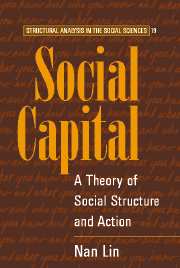Book contents
- Frontmatter
- Contents
- Preface
- Part I Theory and Research
- 1 Theories of Capital
- 2 Social Capital
- 3 Resources, Hierarchy, Networks, and Homophily
- 4 Resources, Motivations, and Interactions
- 5 The Theory and Theoretical Propositions
- 6 Social Capital and Status Attainment
- 7 Inequality in Social Capital
- Part II Conceptual Extensions
- Part III Epilogue
- References
- Index
6 - Social Capital and Status Attainment
A Research Tradition
Published online by Cambridge University Press: 05 June 2012
- Frontmatter
- Contents
- Preface
- Part I Theory and Research
- 1 Theories of Capital
- 2 Social Capital
- 3 Resources, Hierarchy, Networks, and Homophily
- 4 Resources, Motivations, and Interactions
- 5 The Theory and Theoretical Propositions
- 6 Social Capital and Status Attainment
- 7 Inequality in Social Capital
- Part II Conceptual Extensions
- Part III Epilogue
- References
- Index
Summary
This chapter presents a research tradition reflecting the proposed linkage between social capital and instrumental action. Specifically, it investigates how social capital enhances the likelihood of getting better jobs. It thus falls within the general research paradigm known as the status attainment process.
Status attainment can be understood as a process by which individuals mobilize and invest resources for returns in socioeconomic standing. The theoretical and empirical work for understanding and assessing the status attainment process can be traced to the seminal study reported by Blau and Duncan (1967). The major conclusion was that even accounting for both the direct and indirect effects of ascribed status (parental status), achieved status (education and prior occupational status) remains the most important factor accounting for the individual's ultimate attained status. The study thus set the theoretical baseline for further modifications and expansions. All subsequent theoretical revisions and expansions must be evaluated for their contribution to the explanation of status attainment beyond those accounted for by the Blau–Duncan paradigm (Kelley 1990; Smith 1990). Several later lines of work, including the addition of sociopsychological variables (Sewell and Hauser 1975), the recasting of statuses as classes (Wright 1979; Goldthorpe 1980), the incorporation of “structural” entities and positions as both contributing and attained statuses (Baron and Bielby 1980; Kalleberg 1988), and the identification of comparative development or institutions as contingent conditions (Treiman 1970) have significantly amplified rather than altered the original Blau–Duncan conclusion concerning the relative merits of achieved versus ascribed personal resources in status attainment.
- Type
- Chapter
- Information
- Social CapitalA Theory of Social Structure and Action, pp. 78 - 98Publisher: Cambridge University PressPrint publication year: 2001
- 5
- Cited by



